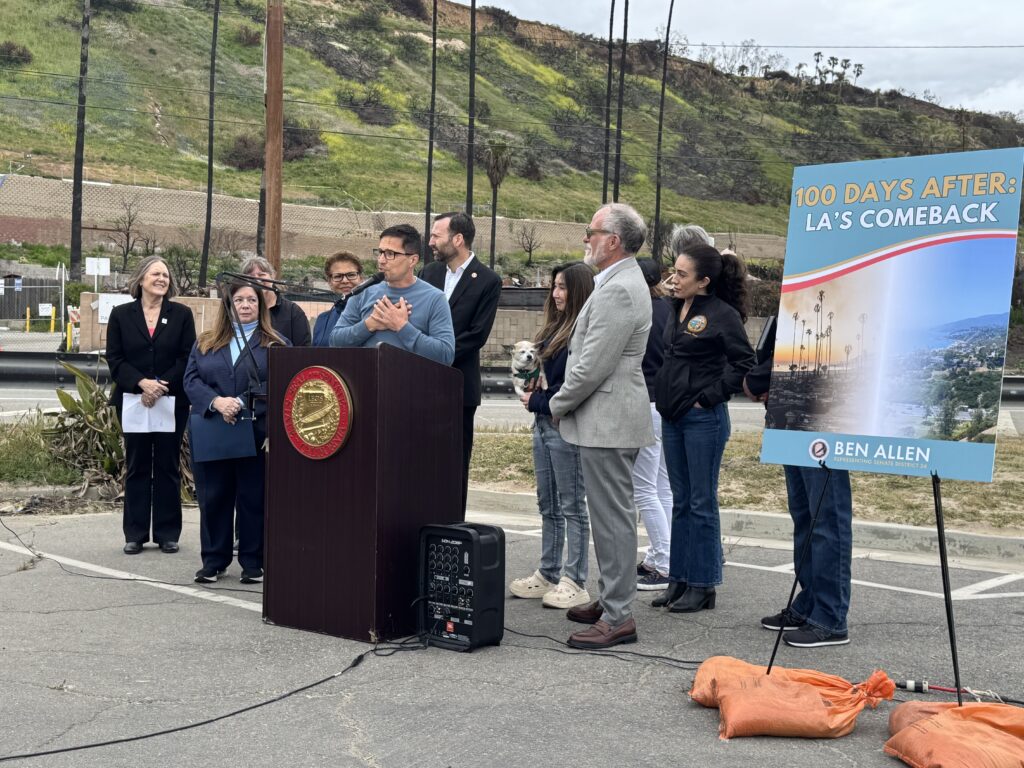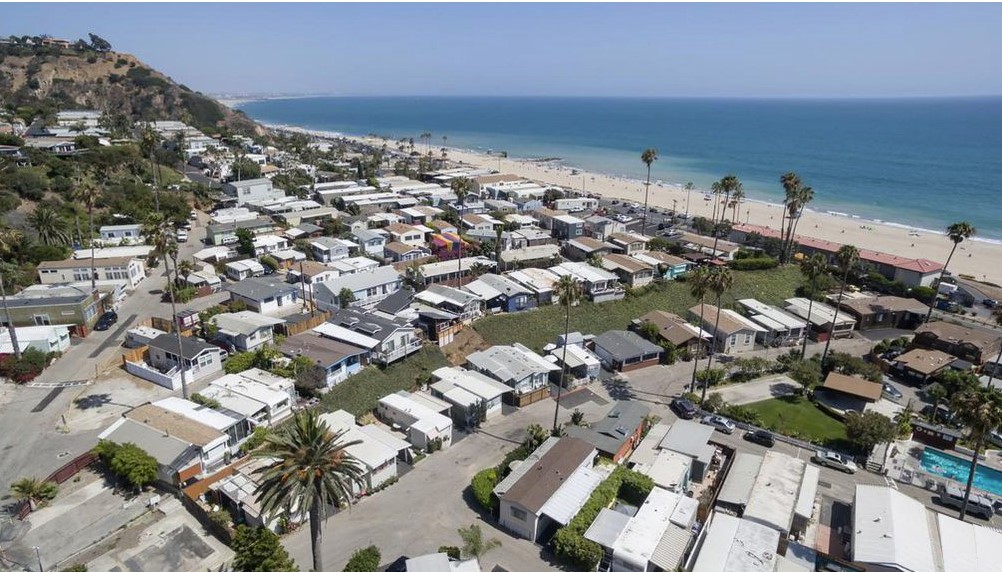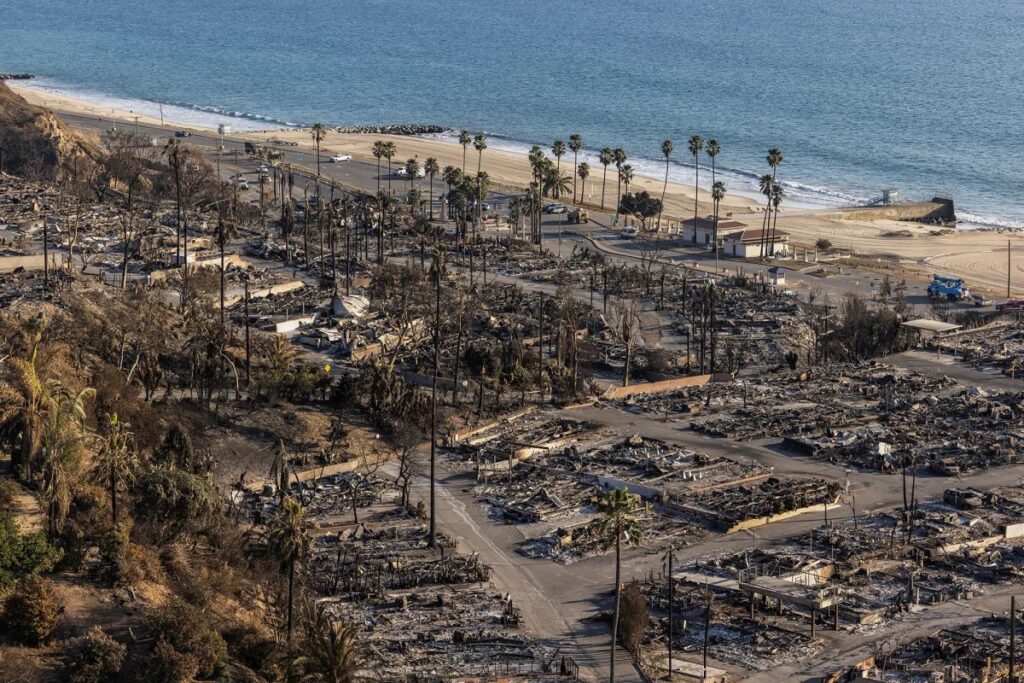
Palisades Bowl resident Jon Brown spoke about the enormity of losing his home at the Palisades Bowl at an April news conference. He is surrounded by City, County and State officials who promised aid.
The Palisades Bowl Mobile Home Park, which had about 350 residents in 170 homes prior to the Palisades Fire, still has not been cleared of debris.
Worse, Bowl residents who had looked to the state, county or city for aid in trying to return to what remains of their homes have found no help.
At the Board of Building and Safety Commissioners meeting on October 8, the Palisades Bowl along with a few other Palisades properties were declared a public nuisance. Gail Gaddi, director of Community Relations for L.A. Department of Building and Safety, explained “Once a property is declared a public nuisance, the owner has the right to abate the nuisance until the Department solicits bids for the work. A timeline has not been established for when the Department will begin to solicit bids.”
CTN contacted the two owners about the next steps for the park that is across from Will Rogers State Beach and the Pacific Ocean, but neither responded.
Although the Army Corp of Engineers cleared the neighboring Tahitian Terrace Mobile Home Park, FEMA denied the Palisades Bowl Owners, calling it a commercial property and adding, because “The property did not meet the criteria for immediate threat to public health and safety due to debris, barriers to the commercial entity completing debris removal independently, insurance coverage and status of claim, and the economic impact of debris removal on the commercial entity and community based on the justification and accompanying data presented in the Applicant’s request letter.”
Why did FEMA treat this property differently than the neighboring property?
It goes to the history of the Bowl. Eddie Biggs bought the 170-unit mobile home park in August 2005 from Fred Keeler.
People own their mobile homes but pay rent on the ground the homes sit on. Those lots were under rent control. Almost immediately after assuming ownership, Biggs attempted to turn the park from tenant occupancy to resident ownership.
In August 2007, residents of the park mobilized to stop the conversion, which would have raised rents. The park was under L.A. City rent control.
Then, Biggs attorney David Spangenberg, spoke to this editor and said “Pacific Palisades is an expensive place to live. People who have bought these properties, like those who live in a park in Palm Springs, have made so much money.
“It becomes a Class A community when residents operate their own community. I think that Eddie Biggs is trying to make this a first-class mobile park with curb appeal–a beautiful property. It would be a good thing for everyone.”
Tenants might have agreed to a conversion, but a larger issue loomed. Seventeen acres of the Asilomar hillside behind the Palisades Bowl (and Tahitian Terrace) is an active landslide.
First documented in 1959, there are two landslides on Asilomar, between El Medio and Almar Avenues. One starts 90 feet below the surface, extends into the Pacific Ocean, and is considered inactive. The other, 35 feet down, is continually moving.
The city owns the upper third of the hill, roughly down to Puerto del Mar, which was made impassable in 2005 after heavy rains buckled the roadway and caused 12 homes in Palisades Bowl to be red-tagged.
The Biggs family owns the bottom part of the hill below the road. The adjacent Tahitian Terrace owned by the McDonald family, owns the land below Asilomar nearest Temescal Canyon.
At the conversion meeting in October 2006, a resident asked Attorney Richard Close of the Santa Monica law firm Gilchrist & Rutter, who was representing Biggs who would be responsible if the park did convert and the hillside came sliding down one day, causing millions of dollars of damage. “Biggs and the homeowners’ association,” Close answered.
In 2012, the City of Los Angeles refused to accept Pacific Palisades Bowl Mobile Estates’ application to convert its 170-unit mobile home park from tenant occupancy to resident ownership because Palisades Bowl had failed to include applications for a coastal development permit or for Mello Act approval.
Several lawsuits followed, and the California Supreme Court agreed with tenants in November 2012 decision that the intended conversion was a “development” for the purposes of the Coastal Act and that there had to be compliance with the Mello Act.
(In 1982, the State of California adopted the Mello Act to preserve and increase the supply of affordable housing in the Coastal Zone. It requires, wherever feasible, that affordable dwelling units be replaced, but they can be placed off-site. (The City of Los Angeles has yet to adopt an ordinance establishing permanent procedures for implementing the Mello Act.)
The Palisades Bowl belonged to Eddie Biggs, who was married twice. He died in March 2021, and the property was split 50-50 between his ex-wife of 56 years Charlotte and his second wife Loretta. This past December Charlotte died, and her funeral was held on January 8, 2025. There appear to be legal issues over the property.
What is clear is that the insurance will cover the loss of the clubhouse, the pool, and communal areas, according to one source, but not the infrastructure. CTN was told the property was underinsured and there is not enough insurance to cover debris removal.
In Cal Matters, click here. Colby, grandson of Charlotte said, “If we have to go invest $100 million to rebuild the park and we’re not able to recoup that in some fashion, then it’s not likely we will rebuild the park. If we can get federal or state funding, it’s a different story.”
“We’re not evicting anybody,” Biggs said. “But if the park’s not rebuilt, then obviously the residents wouldn’t have the right to reoccupy the park.” Palisades Bowl management has paused collecting rent since the fire.
CTN once again reached out to both families, but had not heard back by press time.
The Bowl is zoned RE-40 and CTN reached out to Amalfi Founder Anthony Marguleas about what that designation means. He found that 40,000 square feet (about 0.92 acres) is typically required per single-family residence and the intended use is single-family homes with larger lot sizes – and is one of the more restrictive residential zones in the city.
But since the land is a mobile home park, that is a use protected by state mobile home park laws. Redevelopment would have to comply with RE-40 zoning (or get a zoning change/variance).

The Palisades Bowl is nestled under a mountain, with views of the Pacific Ocean, which is located across Pacific Coast Highway.
(Editor’s note: The Palisades Bowl was covered extensively by this editor when she worked at the Palisadian-Post. Those stories are still available at the Post, but the author’s name was taken off the stories.)


This is beyond disgusting, perhaps even to the level of fraud. So prior to when a prospective Buyer purchases a mobile home on leased land, there should be notice given by the Mobile Home Park OWNERS, that “if our park burns down, and our insurance is lacking due to mismanagement/incompetence, said Buyer will lose their entire investment without recourse.”
What a crock.